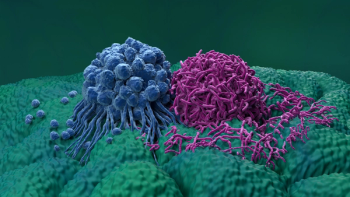
Capmatinib and tepotinib are highly selective kinase inhibitors targeting MET.

Lindsay Fischer is an editor at ONN. She joined MJH life sciences in 2021 after graduating from Rutgers University with majors in both English and Spanish and a minor in creative writing. When she is not writing, or researching the latest oncology nursing news, Lindsay is an amateur backpacker and rollerblader. Email Lindsay at lfischer@mjhlifesciences.com

Capmatinib and tepotinib are highly selective kinase inhibitors targeting MET.

The FDA has granted priority view to osimertinib plus chemotherapy based on data from the phase 3 FLAURA2 trial.

Many Americans with health insurance are not fully covered for frontline procedures to treat lymphedema—a debilitating condition that often affects patients with cancer.

The FDA has approved adjuvant nivolumab to treat completely resected stage IIB/C melanoma.

Older patients with kidney cancer experienced “exceptional” disease control with stereotactic ablative radiotherapy—which is noninvasive and occurs in the outpatient setting.

Clinical navigators helped increase the rate of genomic testing referrals among Black patients with prostate cancer—a group that faces significant health disparities in the care system.

Liquid biopsies helped determine which patients with cervical cancer were at a high risk of recurrence following chemoradiation.

The FDA has approved encorafenib plus binimetinib to treat adults with metastatic non-small cell lung cancer with a BRAF V600E mutation.

Nivolumab plus chemotherapy offers patients with gastric and esophageal cancers a reduced risk of symptom burden and a longer time to deterioration.

Hyperthermic intraperitoneal chemotherapy, also known as hot chemotherapy bath, showed a long-term overall survival improvement in patients with stage III primary epithelial ovarian cancer.

Noël Arring, PhD, DNP, RN, and Debra L. Barton, PhD, RN, FAAN, FASCO, discuss clinical strategies to address sexual dysfunction in female cancer survivors.

Chemotherapy shortages are affecting patients across the country.

Cervical cancer survivors who regularly engage in sex or use vaginal dilators report lower levels of vaginal shortening.

Sarita M. Taylor, BSN, RN, OCN, shares how she mentally recharges outside of the clinic.

The FDA has granted marketing authorization to the Invitae Common Hereditary Cancers Panel, which can detect multiple genetic variants associated with hereditary cancers.

Patients with early breast cancer may safely choose a shorter course of radiation therapy following reconstruction.

The FDA has granted priority review to odronextamab for relapsed/refractory follicular lymphoma and diffuse large B-cell lymphoma.

Ryan Tamargo, NP, AONCP, discusses the launch of an online inflammatory breast cancer scoring system tool.

Meredith Donahue, APRN-BC, discusses emerging therapies in metastatic prostate cancer.

Stephanie Russell, DNP, AGNP-C, highlights the importance of gender-neutral language in the oncology environment.

Lindsey Zinck, PhD, RN, OCN, NEA-BC, and Melania Zisa, RN, BSN, OCN, discuss why it may be time to make the bell ringing ceremony a more inclusive celebration in cancer care.

The FDA has approved bosutinib to treat pediatric patients with Philadelphia chromosome–positive, chronic-phase chronic myelogenous leukemia.

Maura Price, MSN, RN, AOCNS, discusses common infusion-related reactions and the principles of desensitization.

Cheryl VerStrate, DNP, AGPCNP-BC, OCN, explains the pitfalls with at-home genomic tests and why nurses must be ready to talk to their patients about genetic counseling.

Ellen Miller, MSN, FNP-BC, an oncology nurse practitioner, explains how she uses wreath-making to maintain a healthy work-life balance.

Shawna Douglas, a head and neck nurse navigator, weighs in on the unique needs of this patient population.

For patients with ER-positive breast cancer who remain premenopausal—or regain ovarian function—following chemotherapy, 2 years of ovarian suppression may be beneficial.

Kjersten Dosumu, DNP, MS, AGPCNP-BC, explains why investigators are optimistic about treating uterine leiomyosarcoma with olaparib and temozolomide.

Ryan Tamargo, NP, AONCP, highlights how a new diagnostic tool can help improve accurate inflammatory breast cancer diagnoses.

Lynda Balneaves, RN, PhD, provides insights into the new SIO/ASCO guidelines that support mindfulness-based interventions for patients with cancer.